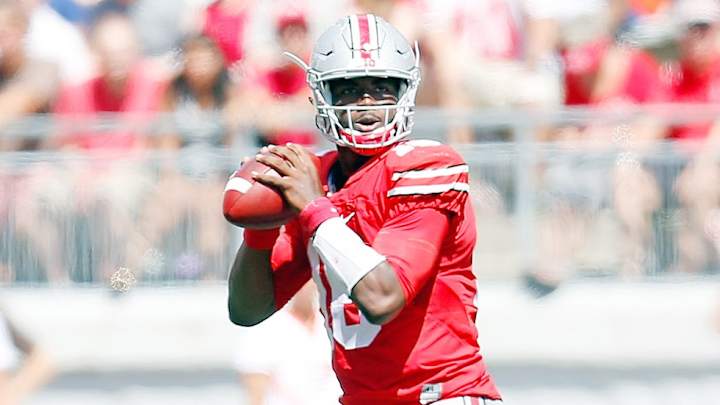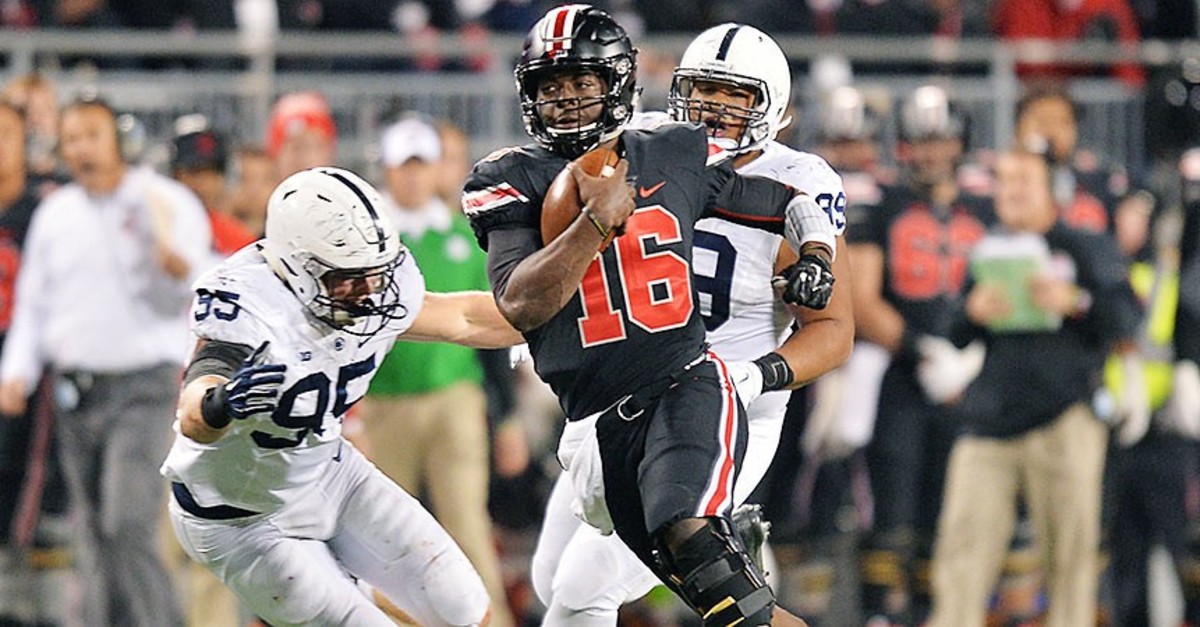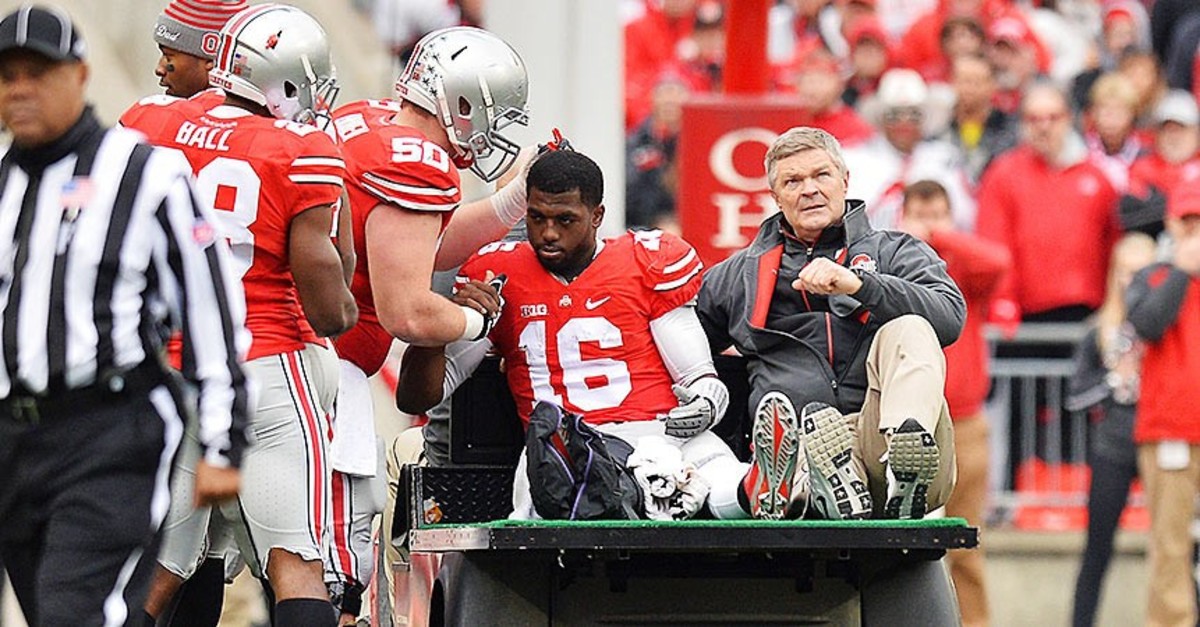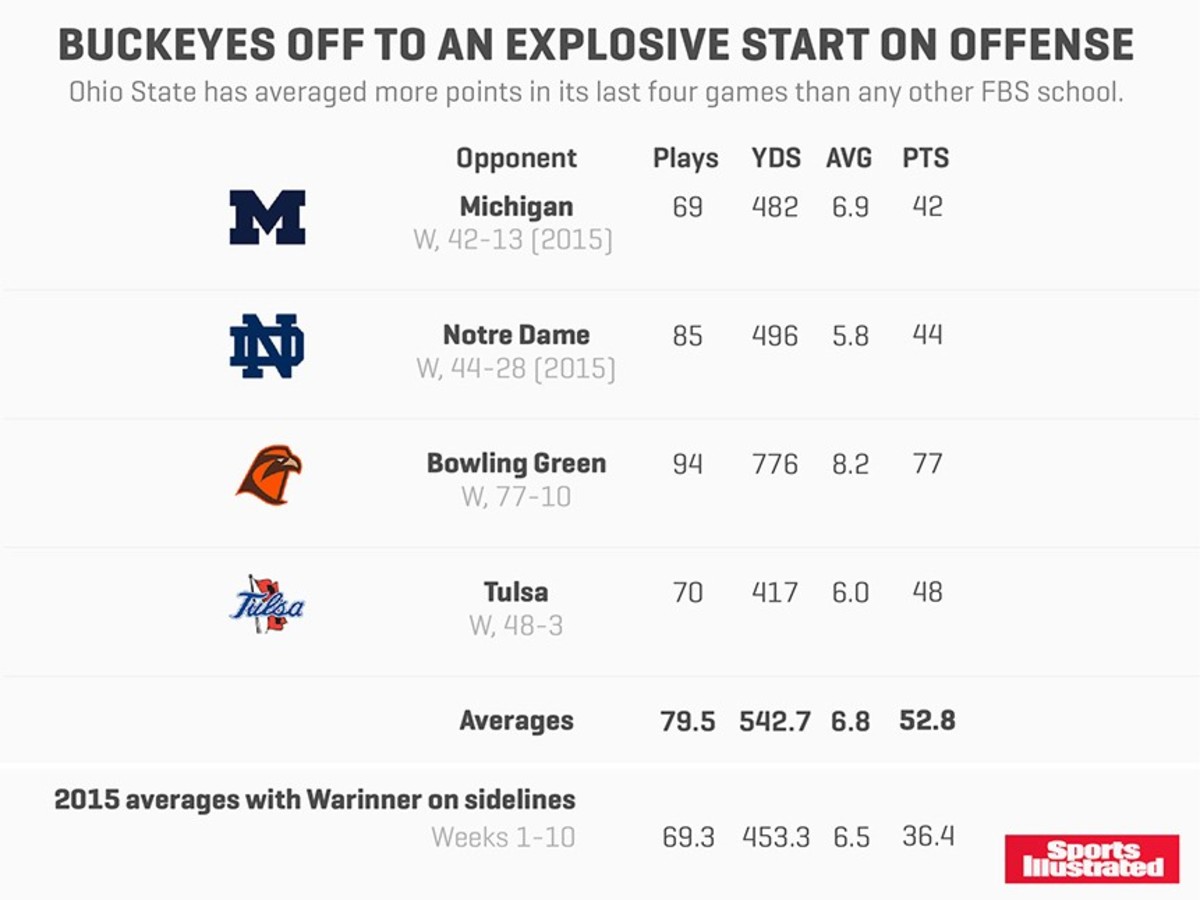The accidental star: Ohio State's J.T. Barrett is winning over his coach, his doubters and—toughest of all—himself

\n
WICHITA FALLS, Texas — Jim Garfield's Toyota Tundra rumbled up I-35 from Austin in the spring of 2011 with quarterback J.T. Barrett riding shotgun. Just a sophomore in high school, Barrett competed at a camp at the University of Texas. On the four-hour trek home, Garfield recalls Barrett contemplating his place in the football universe. "I'm Wichita Falls good, but is that good enough?" Barrett asked Garfield. "I noticed all these people from all over the country. How am I going to be [better than] that guy?"
For all of Barrett's success—a 17–2 record as a starter, the 2014 Big Ten Quarterback of the Year—that question still lingers. His career narrative remains shrouded by doubt and defined by what he's not. At 6' 2", 222 pounds, he lacks prototypical size. His 4.5-second 40-yard dash speed lags compared to elite players at his position. Barrett defended his arm strength last year by famously asking, "Man, I got a weenie arm?"
Barrett's question on I-35 that day has followed his whole career. As a junior in high school, he felt snubbed by his dream school, Texas, when Mack Brown offered a scholarship to quarterback Tyrone Swoopes over him. And once Barrett got to Ohio State in 2013, he lacked the speed of Braxton Miller and the cannon arm of Cardale Jones. When Barrett took over as the Ohio State starter in 2014—only after Miller went down with a shoulder injury—Urban Meyer reacted by saying to himself, "Man, we've got a problem here."
Even after Barrett went 11–1 as a starter, he was considered a placeholder for most of the season. Then, a broken ankle forced him to miss the postseason of Ohio State's national championship run, and he had to prove himself all over.
It didn't help matters that in 2015, just as he'd regain the starting job in late October, Barrett got arrested for operating a vehicle while intoxicated. He served a one-game suspension and stood up in front of the team to apologize. "I was really mad at myself," he says, "being that I put myself in that position, and ultimately it affected our team."
Teammates and coaches describe Barrett, a redshirt junior, as the anti-millennial. He rarely looks at his iPhone, lives alone and typically shows up at workouts by himself. Barrett has always been a thinker and a worrier, as he recalls being petrified of storms during his childhood in Texas's Tornado Alley. As he's evolved from an out-of-shape backup (2013) to a placeholder (2014) to the rock of Ohio State's program for the next two seasons, Barrett says his biggest obstacle has been overcoming his own mind. Along the way, even Barrett had doubts about Barrett. "The main thing with me," he says, "it's almost like I [had to] shut my brain off."
FIAMMETTA: Power Rankings: Where does Ohio State sit entering Week 3?
*****
J.T. Barrett recalls cheering loudly when Vince Young bulldozed through USC in the Rose Bowl to lead the Longhorns to the 2005 national title. Like most kids in Texas, Barrett dreamed of quarterbacking the Longhorns. But his recruitment there typified the end of Brown's tenure in Austin. Instead of evaluating intangibles, the former coach too often signed players because of what could be seen on the surface.
Swoopes stands 6' 4" and 243 pounds, but his physical gifts couldn't mask his quarterbacking deficiencies. (A 1–9 record as a starter during his senior year of high school should have hinted at those.) Now a senior, Swoopes is 6–8 as a Longhorns starter and will finish his career as a fullback masquerading as a back-up quarterback.
"I wanted to go to Texas, but I think Mack Brown saw Vince Young in Tyrone Swoopes, which is fine," Barrett says. "I'm not 6' 5". I'm not 230 pounds. I'm never going to be."
Barrett began maximizing his ability at Wichita Rider High, where he got elected captain as a sophomore. By his senior year, then-offensive coordinator Marc Bindel let him essentially call plays from the line-of-scrimmage during Rider's tempo NASCAR package. Other than Garfield, Barrett was the only person granted permission to address the entire team. "When he spoke, a rawness came out," says Garfield, now the coach at Elgin (Texas) High. "That's just something he was born with, how he'd catch everyone's eye and they'd listen to him."
In Wichita Falls, a town of 104,000 where water towers double as the skyline, Barrett's intangibles trace back to growing up in a military home. He has lived in the same modest house since age 2, with Stacy and Joe Barrett organizing their lives and jobs to accommodate their three boys—Xavier (age 25), J.T. (21) and Stephen (19). Both Stacy and Joe Barrett spent time in the Army, with Joe serving everywhere from Georgia to Korea. They settled the family in Wichita Falls when J.T. was 2 so the boys could have a stable childhood. Stacy Barrett works as a hospice nurse, after taking nursing classes while J.T. was in high school.
Joe Barrett would often be away serving long stretches, so Stacy juggled work and family by working for a cleaning company, Dust Angels, and a moving company when the boys were younger. "I had those jobs that fit with my kids, you know what I mean?" she says. "I did 7 ½ years in the Army, and one of us had to get out or we couldn't be married."
J.T. Barrett's serious nature comes from Stacy, and his athleticism comes from Joe, who ran track at Lamar. In sixth grade, J.T. began waking his dad up at 5 a.m. to go to the gym. J.T. needed to cut weight to play Pop Warner, and Joe laughs recalling the pre-dawn looks he'd get from other adults in the gym. "[J.T.] had to tell one guy, 'My dad ain't dragging me in here,'" Joe Barrett says. "'I'm dragging my dad in here.'"
Along the way, a rare competitive streak developed. Stephen Barrett recalls his brother losing at Madden football to a friend, borrowing the game and playing it until 5 a.m. The next time they played, J.T. crushed him. Stacy Barrett smiles as the story is re-told: "I can understand it because once they started beating me at Connect Four, I stopped playing with them."
So after Texas snubbed him, Barrett had one guiding principle on his college choice: He wanted to find a place where he could win a national title. Texas Tech offered first. Nebraska made him its top recruiting target. He visited Baylor and LSU. But when then-Ohio State offensive coordinator Tom Herman called to check in during April 2012, Barrett gave a thoughtful answer: "Every night before I go to bed, I think about everyone recruiting me. And I picture myself winning the national championship in their colors. And every time I went to sleep, it always came back to Ohio State."
*****

Jamie Sabau/Getty Images
Three weeks into his time at Ohio State after enrolling in January 2013, Barrett encountered a pair of high school receivers on their recruiting visit. Meyer and strength coach Mickey Marotti gave the recruits, James Clark and Dontre Wilson, a pitch before someone asked if anyone had anything to add. Barrett jumped into the presentation uninvited and gave an impassioned appeal to two recruits he'd never met. "He was up in their face like, 'You want to win?'" Marotti recalled with a laugh. "He just went off, selling a program that he really didn't know. He'd just got here."
Off to the side, Herman whispered, "I told you" to Marotti. Both Clark and Wilson signed with the Buckeyes.
"He didn't take a snap of football that spring," Marotti says. "But I knew right away, man. This dude has all the qualities of a leader that we need around here."
But those intangibles didn't help Barrett climb the depth chart or eliminate Meyer's skepticism he could someday win the starting job. He'd torn his ACL five games into his senior year at Rider and showed up at Ohio State a few pounds overweight and limited from the surgery. Barrett recalls Meyer barely acknowledging him, and when the coach did he chided him for being overweight. "He was like, 'fat ass' and this and that," Barrett says. "And I was like, damn, cut me some slack."
Barrett redshirted his first season and failed to beat out Cardale Jones for the backup job in spring 2014. But when Miller re-injured his throwing shoulder in August 2014, forcing him to miss the entire season, Barrett became the accidental starter. "We'll rebound and come back next year," Meyer says he thought to himself. "Braxton will be healthy, and we will go. And get some better quarterbacks in here. That's really what I was thinking."
Barrett's play early affirmed Meyer's doubts, as the then-redshirt freshman looked average in his debut against Navy and Ohio State got stifled in a loss to Virginia Tech in his second start. Barrett pinpoints the fifth start of his career, a 52–24 victory at Maryland, as his pivot point. He calmed his mind by drinking tea the night before, and he recalls everything coming together after a pre-snap adjustment in the first quarter.
On a third-and-goal from the Maryland nine-yard line, he noticed the Terrapins in "no deep" coverage—pure man defense with no deep defender. Instead of a post-in cut, he had receiver Jalin Marshall run a deep corner route to the back of the end zone to exploit the coverage for a touchdown. "Instead of focusing on what I was doing," he says, "I was able to pick my head up and see what they were doing."
Meyer's doubts began to disappear three weeks later at halftime of a tight game at Penn State. Barrett sprained his MCL and team doctors told Meyer that Barrett "probably" wouldn't be available. Barrett shot down that suggestion—"I'm good, coach"—and ran for both of the Buckeyes' overtime scores in their 31–24 victory. "Legendary," Meyer says of Barrett's toughness. "Boy did he fight through it."
Two weeks later, the No. 13 Buckeyes went to No. 8 Michigan State to face the vaunted Spartans' defense. Less than a year after Michigan State stoned Miller and Ohio State in the Big Ten title game to deny them a shot at a national championship, Barrett passed for 300 yards and led the Buckeyes to a 49–37 victory. After the game, he remembers seeing a quote from then-Michigan State defensive coordinator Pat Narduzzi. "He said, 'It was almost as if J.T. knew it before it happened,'" Barrett says. "And I did."
Just as the doubts about Barrett disappeared, his ascent ended nearly as suddenly as it began. In the fourth quarter of a victory at Michigan, Barrett took a read option carry, got dragged to the ground and endured a gruesome ankle fracture. His season ended with a school-record 34 touchdown passes, 3,772 yards and a Big Ten record for total touchdowns (45). "I wondered, 'Why now?' Barrett says. "Being that we were really clicking, especially on offense. I'm asking God, 'Why'"?

Jamie Sabau/Getty Images
*****
When the police sirens flashed in Barrett's rear-view mirror on Halloween night last year, he didn't flinch. Barrett had two drinks that night—Crown Royal, straight—and ended up driving a friend to Taco Bell and back to his apartment. After leaving his friend, Barrett noticed a traffic snarl in front of him and turned around. Having grown up in rural Wichita Falls, Barrett had never seen a police checkpoint to screen for drunk drivers. "[When] the cop car flashed lights or whatever, [I thought,] 'Man, what is this about?'" he says. "I knew I wasn't speeding, I didn't hit anything."
Once the police officer approached Barrett, then 20, and asked him to step out of the car, the gravity of the moment began to hit him. Until being named starter the previous week, Barrett spent the season backing up Cardale Jones amid arguably the most watched quarterback controversy in college football history. Barrett finally took over the job for good the previous week, and suddenly he saw his starting job, the season and the fate of his team in flux. He blew a .09, and TMZ got ahold of his arrest video, which included him mentioning he was the starting quarterback at Ohio State. "It was like, 'Man, J.T., is this happening?'" he says.
That led to a series of uncomfortable phone calls. Barrett called Jones for a ride. He called quarterback coach Tim Beck to alert him. He called his mother and wept openly on the phone. Barrett went to Meyer's house the next day and cried in his den. He later stood in front of his teammates at a team meeting and apologized, his message simple and clear: "I made a mistake, and I owned it."
He sat out a one-game suspension, with Jones leading the Buckeyes to a victory over Minnesota. But what impressed Meyer most about how Barrett handled the incident came a few months later. Barrett knocked on Meyer's office door one day over the winter and shared with him his experience in the 72-hour, state-certified Wellness Driver Intervention program. He got so much out of the speakers he asked Meyer to invite them to speak to his teammates. "Was I wrong?" Barrett says. "Absolutely. And I was aware of that. But instead of like just trying to get through it and kind of putting it in my past and just kind of throw a rug over it, put some dirt on it, it was like, 'J.T., what did you really learn from that?' And you try and prevent it not happening ever again."
Barrett's big takeaway from his alcohol education program was that drinking alcohol doesn't make you a bad person, but it can make you a person of bad judgment. Drew Martensen, the wellness program's executive director, detailed to the team how his alcohol addiction derailed his athletic career and eventually his life. Robert Kent told the searing story of losing his son, a high school senior, after he was hit by a drunk driver on Christmas Eve in 2004. "Most people do profess they learn a lot from our program," Martensen says. "Very few have ever done what he did. I was shocked really."
THAMEL: Can young 2016 Buckeyes recreate success of young 2014 Buckeyes?
*****
Despite Barrett's arrest and the never-ending quarterback controversy, Ohio State's 2015 season still had a chance to conclude with an appearance in the College Football Playoff. The Buckeyes ended up with 12 NFL draft picks, including five of the first 20. But the offense sputtered at times, and once teams had some film to prepare for Jones, his dropback style was revealed as a poor fit for a system more accustomed to running quarterbacks like Alex Smith, Tim Tebow and Miller.
Ohio State's national title hopes finally washed away in a driving rainstorm against Michigan State on Nov. 21. The Spartans kicked a field goal with no time remaining, ending a dismal afternoon when the Buckeyes totaled 132 yards and five first downs. After the torrents of rain came a flood of second guesses. Star tailback Ezekiel Elliott carried the ball just 12 times for 33 yards. Barrett entered the game believing the Spartans' defensive backs "are really not that good," but he couldn't expose them because of the conditions. Still a defeat may have only been a matter of time. "I honestly think if we didn't lose that game, we were going to lose eventually, based on our whole offensive philosophy," he says
Everything for Barrett and the Buckeyes took off from that point, as Ohio State overhauled its play-calling structure and became less concerned about getting specific players touches. Offensive coordinator Ed Warinner began calling the game from the press box instead of the sideline, and Barrett flourished in blowouts of Michigan (42–13) and Notre Dame (44–28) to end the season.
Calling a game from the sideline can make simple information difficult to come by. What's the down and distance? Was a pass complete? If a run play didn't work, did someone miss a block or did an extra safety creep into the box? "You have to listen and digest and there's other stimuli on the sideline going on while someone's telling you all these things," Warinner says. "While up [in the press box], there's a big reduction in external stimulus."
The results of the move have carried over to this season, as Ohio State has led the nation in scoring average (52.8 points per game) since that switch. And after convincing victories over Bowling Green (77–7) and Tulsa (48–3) to start this season, Barrett appears to have outdistanced any lingering doubters. "I think it's his time," Warinner says. "Everything has come full circle. He's started a lot of games, had success, battled injury and battled competition. Now it's clearly his position, his team, and we know his strengths."

*****
In early May, Urban Meyer sits behind the desk in his cavernous, windowless office at Ohio State. He's articulating how much he thinks of J.T. Barrett, and reveals a running dialogue in the Ohio State football facility. "I joke around with him—well, not really joke—but I want him to sit here some day," Meyer says. "I would love for him to be the head coach at Ohio State some day."
Imagine that, the recruit who Meyer doubted could ever play there one day sitting his fat ass in the head coach's chair. Not surprisingly, coaching is something Barrett has considered thoroughly. "I have a lot of respect for the coaches, being that they spent a lot of time away from home," he says. "That's not something I'm sure yet that I'm willing to give up, especially if I want to be there for dance contests, singing recitals and piano."
For now, Barrett projects as a backup quarterback in the NFL. One scout familiar with Barrett offered this report: "I feel like if [former TCU quarterback] Trevone Boykin can find a spot in Seattle, J.T. can find a place as well."
Barrett says he's approaching his career like he'll be in Columbus through the 2017 season—"I don't feel like I'm going anywhere, I'm not worried about it"—which means he could leave as one of the great all-time quarterbacks in Ohio State history. Records like Art Schlichter's 37 wins as a starting quarterback are within reach if he stays healthy, and Barrett could leave Columbus as the most decorated quarterback in Ohio State history. "Yeah, it's pretty crazy," Barrett says. "Coach Meyer told me that not too long ago. But it was like, 'Woah, are we talking about Ohio State?' I'm just a young punk from Texas from a small town of Wichita Falls."
ROUNDTABLE: Can Ohio State afford to lose to Oklahoma?
The next step for Barrett will be to lead the Buckeyes to a national title, after he watched them do it from a scooter on the sideline while injured in 2014. A game at No. 16 Oklahoma on Saturday will offer the first clues as to whether this No. 3 Ohio State team is championship caliber.
As for Barrett personally, as he plays up I-35 in Norman on Saturday, just two hours from his hometown, he'll aim to continue to outdistance himself from the doubters and show just how far he's come.
